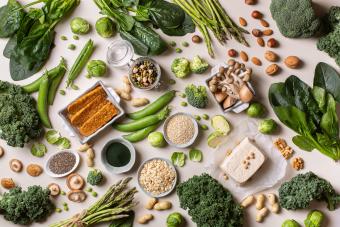
Following a vegetarian diet has its advantages. Eating a meat-free diet can be beneficial for your health, the environment, and the welfare of animals. But as with any eating style, there are also potential disadvantages to being vegetarian.
If you are thinking about making the switch to a plant-based diet and especially if you're on the fence about vegetarianism, arming yourself with knowledge of the potential cons of a vegetarian diet can help you make an educated decision about what way of eating is best for you.
10 Potential Disadvantages of Being a Vegetarian
Every eating style has upsides and downsides. There are also many reasons why someone might choose a particular diet - like a vegetarian diet. You may have health reasons to switch or it may be that you have concerns about the environment have sparked an interest in plant-based eating. But before you make the switch, consider these possible disadvantages of vegetarianism.
If you are worried about any of these issues, you might be relieved to find that many of them are based on misconception. But it can be helpful to understand each concern fully. Whatever diet you choose should be sustainable, and understanding these potential drawbacks might help you to make the best choice for you.
1. It Can Be Hard to Eat Enough Protein
Protein is an essential nutrient the body uses to build and repair muscle, bone, hair and skin, and nearly every other body part. One of the primary reasons people avoid a plant-based diet is because they are concerned they won't get adequate amounts of protein in their diet, since animal-sourced foods are known to be high in protein.

Fortunately, there are plenty of plant-based proteins, including:
- Green vegetables: broccoli, spinach, peas, Brussels sprouts, asparagus
- Legumes: lentils, beans, edamame, soy, peanuts
- Nuts and seeds: almonds, pistachios, flax seeds, hazelnuts, pecans, sunflower seeds
- Whole grains: wheat, quinoa, buckwheat, millet, rice
On their own, many plant sources of protein are incomplete for the body's nutritional needs. The good news is, vegetarians can ensure they get all the required components of proteins by eating a good variety of plant-based protein sources. Despite the concern of vegetarians lacking in protein, a 2019 study found that most vegetarians' protein intake is sufficient, except for those who do not consume protein-rich plant sources.
2. You Might Have Limited Meal Choices
The common perception that vegetarian diets offer limited meal choices is simply a myth. There are countless meal options for vegetarians, including quick & easy vegetarian meals, and plenty of vegetarian snacks. Vegetarian cookbooks can offer inspiration for tasty, nutritious meals.
If you're new to vegetarianism, give yourself time to transition to this new way of eating. If your favorite dish is meat-based, consider looking for plant-based substitutes to cook your favorites, such as vegetarian meatloaf or vegetarian chili. You may want to try meal planning once a week to avoid any last-minute stresses about what to cook for dinner. Try adding one new food or vegetarian recipe that feels manageable as you shift your diet from the standard meat-and-potatoes to a plant-based diet.
3. Eating Out Can Be a Challenge
Dining out as a vegetarian can be a real challenge at times, as some restaurants do not offer vegetarian meals, or vegetable dishes are cooked with animal-based ingredients, such as gelatin, meat stock, or animal-based fats. The good news is that as plant-based diets grow in popularity, more restaurants are offering vegan and vegetarian options on their menus than ever before. A recent report from the AI platform Tastewise shows that plant-based meat is now on restaurant menus 1,320% more since 2020.

Vegetarian and vegan restaurants are also becoming more popular as the demand for plant-based foods skyrockets. Even fast-food restaurants have jumped on the plant-based trend. If you're looking for a plant-based restaurant in your area, Happy Cow offers a directory with listings of restaurants and cafes that offer plant-based foods. Search by state or city to find a restaurant that can accommodate both your diet and cravings.
4. Dinner Engagements Require an Explanation
If you've been invited to a dinner party with friends or colleagues, it is important to make them aware of your dietary needs. You may feel a little awkward about asking for special dietary accommodations, but there are polite ways to share your eating preferences. Let your dinner host know well in advance (at least a week) about your vegetarian diet. This gives them plenty of time to prepare an alternative meal or add plant-based dishes to the evening fare.
If you're able, you may want to offer your host some help - offer to bring a vegetarian dish to share with everyone, or offer to bring your own entrée if it seems like too much work for your host to add a separate dish for you. You may get some questions about your diet at the dinner party. Remain gracious, light-hearted, and brief in your responses. Eventually, your meal choice will fade into the background and become a non-issue as dinner progresses. If you're attending a potluck or a party, always bring something that you can eat to make sure that you are covered.
5. Family and Friends May Have Different Eating Habits
When you've changed your diet from omnivore to vegetarian, sometimes social situations with friends and family can cause anxiety. Some friends and family will congratulate you, others may ask you about your reasons for becoming a vegetarian, and some may outright challenge you about your choice. You may meet people who feel your choice is a threat to their own way of eating or push meat-based food on you.
Don't give in to the pressure. Instead, meet these challenges with a calm demeanor. Help others understand why you are a vegetarian, and answer their questions with thoughtful responses without coming off as "preachy" or sanctimonious about your eating habits.
It may be helpful to practice your responses to potential scenarios before they come up, so you feel ready to respond the next time you get a certain question or comment. Eventually, your friends and family will understand your food choices and it won't be such an issue. Consider finding a network of other vegetarians to provide mutual support and inspiration (and tasty dinner parties!).
6. Traditions for Holidays May Need to Change
Turkey for Thanksgiving, ham for Easter, pot roast for Christmas. For some plant-based eaters, these traditional meat-based holiday meals are so ingrained that they may even break from their vegetarian routine over the holidays just to enjoy them. But many vegetarians find ways to indulge in their holiday feast without the meat.
If you'd rather opt out of the meat portion during your holiday meals, it can be helpful to find substitutes so you can ensure you get the nutrients you need. You may want to explain your food choices to your family prior to your holiday gathering so the host can accommodate your diet. But if you don't want to stress your host, offer to bring vegetarian dishes for yourself or for everyone to try. Holiday traditions can still be maintained - and the food can still be delicious - with meat substitutions and ingredient swaps.

7. Vegetarians Have to Learn How to Cook
While you can go through life eating prepared foods without meat, most pre-packaged or frozen foods don't offer the nutrients your body needs to stay healthy. Eventually, you'll need to crack open a good vegetarian cookbook and get creative in the kitchen to keep your palate happy and your body healthy.
If you're not a whiz in the kitchen, this can feel intimidating. Start with simple meals, such as scrambled eggs with a side of vegetables. Look for easy-to-make vegetarian entrees online and ask vegetarian friends for quick & easy vegetarian meals. If you're new to cooking, start slow and add a new food or recipe to your menu each week until you feel more comfortable and confident in the kitchen.
8. Vegetarians Need to Read Food Labels
Depending on your level of commitment to vegetarianism, you may wish to begin reading food labels. Even vegetable-based food products often contain animal oils or fats. Look for food products with a V or VG on the front of the label, which means it is certified vegan or vegetarian.
As you look at food labels, scan the package for obvious animal products, such as milk, eggs, beef, or chicken. As the popularity of plant-based foods continues to grow, it is easier than ever to find vegetarian-friendly food products. A simple online search turns up scores of specialty vendors that offer foods for people on a plant-based diet.
9. You May Need Dietary Supplements
If you consume a meat-free diet, you may be more likely to have nutritional deficiencies. Studies suggest that vegetarians may be deficient in vitamin B12. Vitamin B12 is an essential nutrient known to play a role in red blood cell formation, support bone health, and impact energy levels and mood. Food sources high in vitamin B12 include meat, poultry, fish, and dairy.

Dietary supplements with vitamin B12 are strongly recommended for vegetarians who do not get sufficient levels of this nutrient through diet alone. Multivitamins designed specifically for vegetarians should contain sufficient levels of B12, as well as B12 capsules or nasal sprays, according to the Mayo Clinic.
10. Vegetarians Have a Higher Risk of Bone Fractures
Studies show that people who eat a vegetarian diet are at an increased risk of bone fractures, particularly hip fractures. Vegetarians tend to have lower bone density than those who consume meat. This is likely due to a lower intake of nutrients that support bone health, such as calcium, which leads to weaker bones. Researchers suggest that lower muscle mass and body weight often seen in vegetarians may also play a role in this increased risk of fractures.
Plant-based diets offer plenty of health benefits, including a lower body mass index (BMI) and a lower risk of heart disease and diabetes. If you're a vegetarian, you can reduce your risk of fractures by ensuring you get adequate levels of calcium and protein through plant-based sources.
Should the Cons of Being Vegetarian Deter You?
Transitioning from meat eating to a vegetarian diet takes work and commitment, but with patience, time and education, you can be a happy, healthy vegetarian in no time. Just be sure to consider the pros and cons of plant-based eating to be sure that the diet is sustainable for you.
Once you've made your decision, be sure to educate yourself about how to eat a well-balanced, nutritious diet with plenty of protein. Prepare yourself for questions from friends and family about your new way of eating, particularly around the holidays. Have a plan for eating out, learn to read food labels, and explore cooking new dishes. Over time, the challenges of switching to a vegetarian diet will be a distant memory as you find your rhythm as a plant-based eater.







